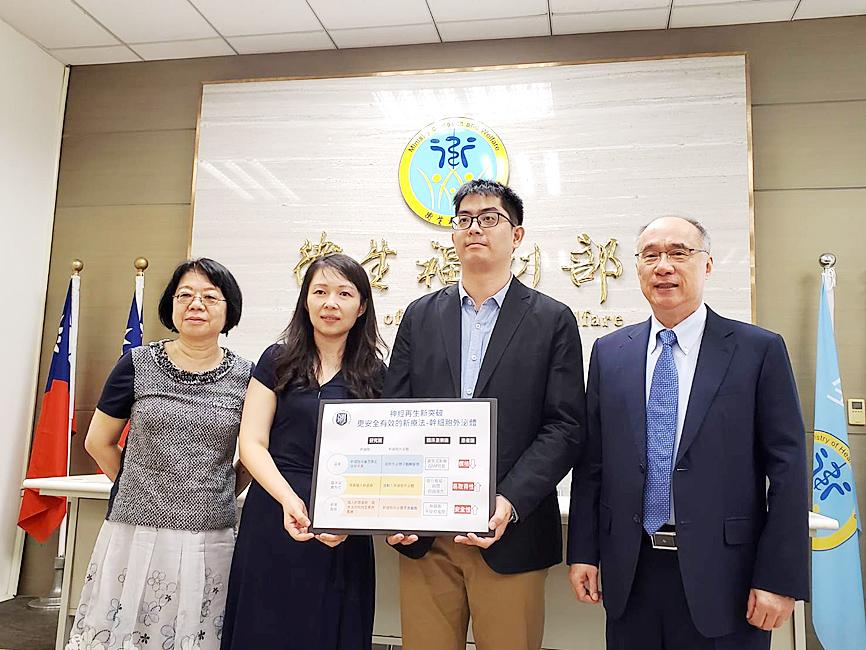Exosomes derived from stem cells have the potential to regenerate damaged brain cells, and could someday be used for to treat brain damage and neural degeneration diseases, researchers from the National Health Research Institutes (NHRI) said yesterday.
Team leader Li Hua-jung (李華容), an associate investigator at the Institute of Cellular and System Medicine, told a news conference in Taipei that brain damage and neurodegenerative diseases often cause irreversible impairment for patients, and increase the risk of dementia.
More than 270,000 people in Taiwan are estimated to have dementia, which is a big challenge to the nation’s aging society, she said.

Photo: Lin Hui-chin, Taipei Times
Traumatic brain injury, unhealthy habits, hypertension, diabetes, long-term stress or mental illness are all potential risk factors for brain damage and neurodegenerative disease, she said.
Although clinical studies have suggested that stem cells have the potential to repair a damaged central nervous system, there are risks of complications from implantation, ectopic tissue formation and unwanted engraftment, Li said.
Her team spent seven years studying alternatives, and discovered that exosomes secreted by mesenchymal stem cells found in human bone marrow or fat tissues contain substances that can facilitate cranial nerve regeneration and brain functional recovery.
The exosomes are tiny vesicles that contain genetic information and biologically active substances, including proteins, RNA and other substances, and serve as mediators in cell-to-cell communication, she said.
As exosomes do not have a nucleus and will not grow after implantation, using them in therapy might reduce many of the safety concerns related to the use of living stem cells, she said.
After injecting such exosomes into brain-damaged mice, the team found that after a week the mice’s damaged nerve cells gradually grew synapses, and after a month the number of nerve cells in the damaged brain area was restored to about 60 percent, with the mice showing improvement in cognition, learning and memory.
The study showed that stem cell-derived exosomes have the potential to treat brain damage and neural degeneration diseases, and could possibly be developed for treating degenerative diseases, tissue or organ damage, cell deficiency, Parkinson’s disease or other diseases, Li said, adding that the team has patented their discovery in Taiwan and is applying for patents in the US, the UK and Japan.

MAKING WAVES: China’s maritime militia could become a nontraditional threat in war, clogging up shipping lanes to prevent US or Japanese intervention, a report said About 1,900 Chinese ships flying flags of convenience and fishing vessels that participated in China’s military exercises around Taiwan last month and in January have been listed for monitoring, Coast Guard Administration (CGA) Deputy Director-General Hsieh Ching-chin (謝慶欽) said yesterday. Following amendments to the Commercial Port Act (商港法) and the Law of Ships (船舶法) last month, the CGA can designate possible berthing areas or deny ports of call for vessels suspected of loitering around areas where undersea cables can be accessed, Oceans Affairs Council Minister Kuan Bi-ling (管碧玲) said. The list of suspected ships, originally 300, had risen to about 1,900 as

Japan’s strategic alliance with the US would collapse if Tokyo were to turn away from a conflict in Taiwan, Japanese Prime Minister Sanae Takaichi said yesterday, but distanced herself from previous comments that suggested a possible military response in such an event. Takaichi expressed her latest views on a nationally broadcast TV program late on Monday, where an opposition party leader criticized her for igniting tensions with China with the earlier remarks. Ties between Japan and China have sunk to the worst level in years after Takaichi said in November that a hypothetical Chinese attack on Taiwan could bring about a Japanese

MORE RESPONSIBILITY: Draftees would be expected to fight alongside professional soldiers, likely requiring the transformation of some training brigades into combat units The armed forces are to start incorporating new conscripts into combined arms brigades this year to enhance combat readiness, the Executive Yuan’s latest policy report said. The new policy would affect Taiwanese men entering the military for their compulsory service, which was extended to one year under reforms by then-president Tsai Ing-wen (蔡英文) in 2022. The conscripts would be trained to operate machine guns, uncrewed aerial vehicles, anti-tank guided missile launchers and Stinger air defense systems, the report said, adding that the basic training would be lengthened to eight weeks. After basic training, conscripts would be sorted into infantry battalions that would take

DEEP-STRIKE CAPABILITY: The scenario simulated a PLA drill that turned into an assault on Taiwan’s critical infrastructure, with the launchers providing fire support Taiwan yesterday conducted this year’s first military exercises at Longsiang Base in Taichung, demonstrating the newly acquired High Mobility Artillery Rocket System’s (HIMARS) ability to provide fire support and deep-strike capabilities. The scenario simulated an attack on Penghu County, with HIMARS trucks immediately rolling into designated launch areas and firing barrages at the Wangan (望安) and Cimei (七美) islands, simulating the provision of fire support against invading forces. The HIMARS are supposed to “fire and leave,” which would significantly increase personnel and equipment survivability, a military official said. The drill simulated an exercise launched by the Chinese People’s Liberation Army (PLA) Eastern